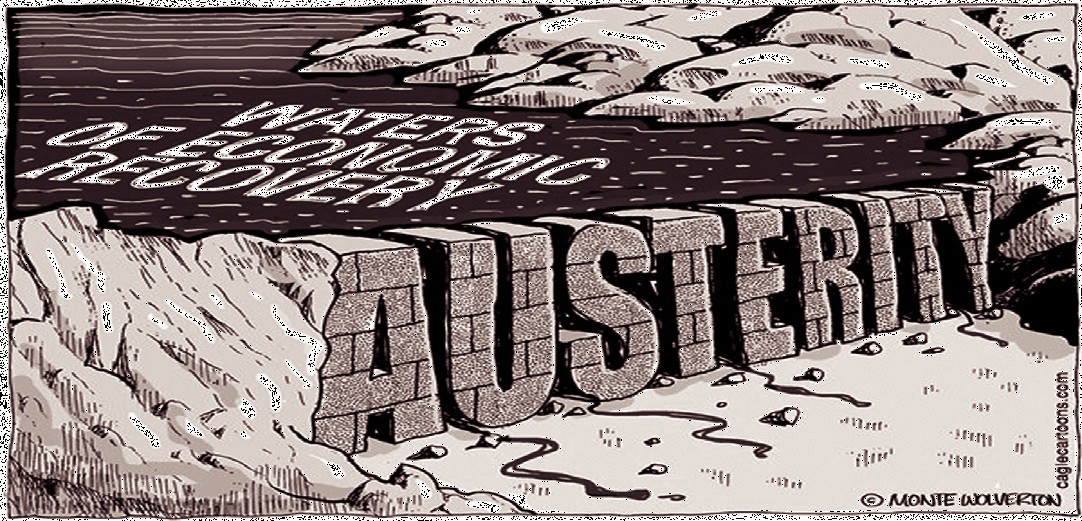
“Inequality is not a by-product of the system: inequality is the central point of the capitalism,” John Hilary tells me. Hilary is executive director of War on Want, which is working to fight poverty and tackle injustice at its roots.
“We need to recognize that capitalism is systemically based on the impoverishment of many for the benefit of the few. Inequality is integral through the appropriation of surplus value from the majority accumulating to the center,” he says.
War on Want stands out from other U.K. non-profits, NGOs and charities in the way that it advocates for structural change. Hilary’s book, "The Poverty Of Capitalism," suggests that capitalist growth, the mantra of the modern world, is leading to unprecedented inequality and ecological destruction.
“There is a discourse that your country’s growth is somehow a unitary entity,” says Hilary, citing the way Britain’s economy is growing but mainly only to the enrichment of its financiers and heads of corporations. “Yet if you're one of the people being kicked in the teeth, losing your job then losing your benefits on the frontline of austerity, then there is no recovery at all.”
Hilary is critical not only of U.K. government policies, but of mainstream charities that expect to solve poverty by throwing aid at poor people. Instead, he advocates challenging exploitation at its root.
“We need alternatives,” he asserts, “like resisting free market neoliberalism, ending the privatization of the commons and public services, recreating public space, resurging natural resource sovereignty, grassroots food sovereignty and a bigger movement for popular and social sovereignty.”
I ask which alternatives he finds most inspiring.
“Places that have successfully renegotiated the social contract, like Bolivia and Ecuador," he answers, highlighting as well the Movimento Sem Terra (Landless Workers Movement) in Brazil, with whom War on Want has partnered to help resettle thousands of families. "We also have to appreciate movements like the Mexican Zapatistas that for 20 years have been creating autonomous areas that work to a different tune.”
Additionally, he points to the Décroissance degrowth movement in France.
Two of War on Want's key campaigns call for tax justice and trade justice. A further focus is on stopping the business of war, which is entwined with the capitalism equation.
“War will always stand behind the most far-reaching imperialist adventures as a veiled threat if things don’t go to plan,” he says, citing the U.S. invasion of Iraq as a disastrous example. “The single biggest threat to Western Capitalism is its dependency on oil, [and] as a result of this existential threat it will unleash the full might of its arsenals.”
War is more complex than sending troops to capture resources in the lands that they invade, he adds. Rather, the targets are chosen precisely.
"Transnational capital sees the world in terms of key choke points: it focuses on dominating any places that could threaten its future control. For instance, the crisis in the middle East revolves around Israel as a western proxy: holding its neighbors at bay.”
Most capitalism, therefore, does not come at the barrel of a gun. “Other mechanisms, such as free trade agreements, embody the last 30 to 40 years of the neoliberal project,” he adds.
To that end, War on Want is teaming up with the World Development Movement to fight the Transatlantic Trade and Investment Partnership, or TTIP. The group calls the free trade agreement "a charter for deregulation, an attack on jobs and the end to democracy."
Earlier this year – the centennial of WWI – the Guardian reported that Britain has fought in each year since 1914. The War on Want's publication, "Great Game," looks at motivations for war from the perspective of the military industrial complex. Because war is justified today in different ways than it was in the past, says Hilary, the anti-war movement needs to redirect its focus.
“Governments now apply internationalist ideas of responsibility, based on the UN doctrine on the ‘right to protect' that legitimizes liberal intervention on 'humanitarian grounds.' In doing so," he says, "they sold the bombing of Libya as a necessary evil, but do not mention the 32 oil and gas contracts between British companies and Libya.”
Conservative MP Alistair Burt has written about ways politicians with vested capitalist interests are encouraging humanitarian intervention. Burt and 40 other U.K. parliamentarians are members of the Henry Jackson Society, which advocates military intervention when it benefits big oil and security firms.
Burt himself has accepted donations from repressive Middle East regimes and earns over £800 an hour as a consultant for PLLG Investors, which is owned by billionaire oil baron Peter Levine.
Since the public no longer tolerates military ventures that result in massive troop deaths, like in Vietnam, violent conflicts are increasingly outsourced to private contractors, says Hilary. “This privatization has happened since the Gulf War, with British companies [and] leading players including G4S, Aeiges and Saracen.”
He likens the current rise in corporate mercenaries to earlier days of British imperialism – for instance, the East India Company’s private army of 200,000 soldiers who subjugated India two centuries ago. Now, warfare relies even less on human fighters and more on "surgical strike" bombings by drones, leading to rising numbers of civilian deaths in places like Pakistan and Yemen.
But perhaps the most convincing, popular argument against war, concludes Hilary, is the economic one. “At a time when there is no money available, the government wants to spend £100 billion replacing Britain’s trident nuclear submarines. This is just criminal: replacing a defunct weapon of mass destruction when there is austerity and rising inequality.”
View Steve Rushton's Commons page to learn more about him or read his other articles.
3 WAYS TO SHOW YOUR SUPPORT
- Log in to post comments














Comments
WatsonZion replied on
Customary way of thinking
Customary way of thinking holds that where either private enterprise or vote based system prospers, the other should soon take after. However today, their fortunes are starting to veer. Private enterprise, long sold as the yin to popular government's yang, is flourishing, while majority rule government is attempting to keep up. http://www.ontimepaper.com/masterthesis/